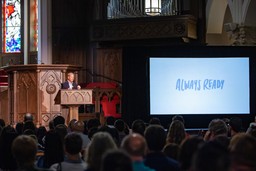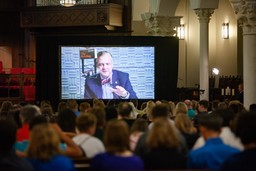Always Ready Youth Conference: Only One Way?
Posted On September 14, 2018
On Saturday, RBC hosted its youth conference, Always Ready, and over four hundred people attended to hear faculty sessions on a variety of apologetic topics.
In the opening session, “The Way, the Truth, and the Life,” RBC President Dr. Stephen Nichols introduced the theme of the Always Ready conference through perhaps the most controversial teaching about Jesus: that He is the only way for salvation. Dr. Nichols writes about his session:
In John 14:6, Jesus declared to His disciples, “I am the way, the truth, and the life.” He added, “No one comes to the Father except through Me.”
These words meant a great deal to the disciples at the time. They were anxious. They lived in a time of pluralism, skepticism, and even despair. Jesus was telling them that He alone is the answer to all three and that only in Him we can have salvation.
Our time in 2018 is not all that different from the first century. And these three words still apply. Today we have many people telling us that all religions are equally valid and that all roads lead to heaven. This is the pluralist. To the pluralist we can say that Jesus is the way. He is the one and only Way.
We also have skeptics and agnostics, even cynics. We are told that we live in postmodern times and that there’s no such thing as truth anymore. All we have is opinions. To that Jesus declares, “I am the Truth.” And we also have the hopeless, the desperate, even those verging on nihilism. It is sad that in an age of so much, we have so many people who feel so desolate and so empty. We have even young people who have simply given up. To this darkness Jesus says, “I am Life.”
The pluralist, the skeptic and cynic, and the nihilist all meet their match in Jesus. He is the answer to each and every question, because He alone is the Way, the Truth, and the Life.
Watch Dr. Nichols’ session on our Youtube channel today.
The pluralist, the skeptic and cynic, and the nihilist all meet their match in Jesus. He is the answer to each and every question because He alone is the Way, the Truth, and the Life. —Dr. Stephen Nichols
RBC faculty members then led respective breakout sessions on the different popular false gospels, the danger of conforming Christ to our own ideas, and the connection between Christ, the cross, and our hope.
Academic Dean and Professor of Theology Dr. John Tweeddale spoke on the various false gospels that are popular in our culture such as secularism, Islam, and religious apathy, looking at how the good news of Jesus Christ is the only true gospel.
He explained that as Christians, we often conceive of false gospels only in terms of organized religions that reject the exclusive truth claims of Christianity. We need to think more comprehensively about what constitutes a false gospel. Simply put, a false gospel is any belief or practice that is contrary to God’s Word. From this perspective, anytime we seek to find favor from God apart from faith in Christ, we are guilty of believing a false gospel. At root, a false gospel is a form of self-justification. We believe we can gain standing before God on the basis of personal worth or achievement.
If we probe a little more deeply, we should be able to see that a false gospel cannot be limited either to organized religion or to personal attempts at self-justification. A false gospel is a counterfeit belief system that governs your life. It not only shapes how you relate to yourself and the world around you; it also promises to infuse your life with meaning and significance.
The gospel of the Lord Jesus Christ does not say that He accepts you according to who you are or what you do. It accepts you for what Jesus Christ did for you on the cross. —Dr. John Tweeddale
Professor of Systematic Theology Dr. Keith Mathison spoke on how even in our secular age, Jesus remains a popular figure in our culture. However, the Jesus that is popular rarely lines up with the Jesus who is revealed in Scripture.
Dr. Mathison went on to look at various views of Jesus popular in our culture, exhorting believers not to embrace subjective definitions of Jesus but to remain true to Christ as He is revealed in the Bible.
He explained how our conference is focused on the exclusivity of Christ among the competing claims of non-Christian faiths and non-faiths. The Christian attempt to defend the exclusivity of Christ is complicated and compromised when Christians themselves create multiple Christs in their own images, and it’s no accident that the Christs we construct tend to agree with whatever our already existing theological, ethical, cultural, and political views are. This danger exists as much among conservative evangelicals as it does among liberals. We can easily conform Christ to our own image rather than being conformed to His. We can very easily fall into the idolatrous trap of having our own personal Jesus rather than the Jesus who is revealed in the Scriptures, the Word made flesh. Watch Dr. Mathison’s session on our YouTube channel today.
Are the heretics, liberals, and cults the only ones guilty of creating a Jesus according to their own imaginations? No, they’re not. Even we can project all that we believe into Jesus. —Dr. Keith Mathison
Professor of New Testament Dr. David Briones provided an overview of some of the key theological concepts associated with the mediatorial work of Christ. He explained how the hope of salvation proclaimed by biblical Christianity is grounded in the life and ministry of Jesus Christ.
Dr. Briones explored how Paul passionately preached the gospel of Jesus Christ. At the core of that message was a powerful statement: Jesus Christ is Lord (2 Cor. 4:5). The places where he preached this message were tolerant and inclusive. So, you can imagine how much hostility was directed against this intolerant and exclusive message of salvation.
The ancient world despised this message of hope. People considered it a hopeless cause and a narrow-minded philosophy or religion. They derided the claims of Christianity, but Paul continued to declare and defend them—that only Jesus Christ is Lord, that only Jesus Christ mediated salvation through the cross, and that the person and work of Jesus Christ is our only hope of salvation. In a world that tolerated many “mediators” of salvation and several religious paths to peace with God, Christians needed to be reminded what Scripture affirms about Jesus, the cross, and our only hope. Therefore, we must consider the tolerant and inclusive message of the world before re-solidifying the intolerant and exclusive claims of Christianity within our own hearts, so that we, too, can declare and defend the truth of the gospel in our hostile world: “Jesus is Lord” (1 Cor. 12:3).
Humble boldness is an effective tool in defending the faith. Prideful condescension is not. —Dr. David Briones
Exclusivism says there is one God and one way. Inclusivism says that there is one god and many ways.—Dr. Stephen Nichols
To conclude the conference, Dr. Albert Mohler, president of The Southern Baptist Theological Seminary, joined via Skype for a live Q&A session on relevant topics. Watch Dr. Mohler’s session on our Youtube channel today.
For more about our college, visit ReformationBibleCollege.org.





